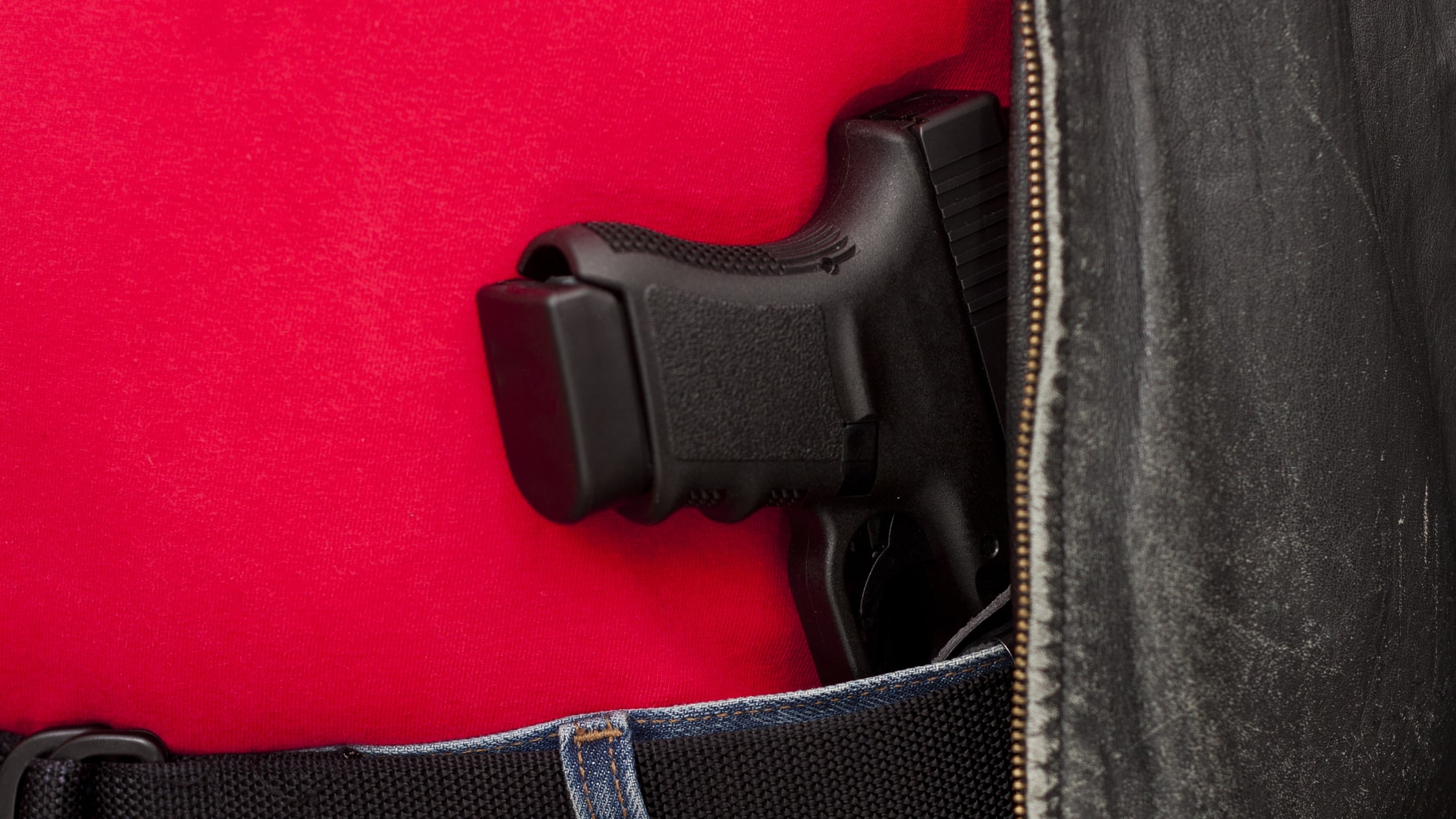Putting more guns on the street
As gun violence soars across the nation, many states are making it far easier to buy and carry concealed weapons

A free daily email with the biggest news stories of the day – and the best features from TheWeek.com
You are now subscribed
Your newsletter sign-up was successful
As gun violence soars across the nation, many states are making it far easier to buy and carry concealed weapons. Here's everything you need to know:
What has changed?
A growing number of states have passed laws authorizing citizens to carry weapons in public without a license. In 2011, only a single state, Vermont, allowed "permitless carry." But as of last month, when Georgia, Indiana, Ohio, and Alabama passed such laws, 25 states do. Eleven of those states passed their laws within the past year. It's part of an aggressive effort to roll back state gun restrictions; at the same time, congressional Republicans have blocked all efforts to expand federal gun-safety laws. The removal of restrictions comes at a time when gun violence in the U.S. is surging. Gun purchases hit a record 22.8 million sales in 2020 — and in the same year, gun-related deaths reached a new high, at more than 45,000. National statistics for 2021 aren't yet compiled, but many cities have reported even worse numbers for gun violence.
The Week
Escape your echo chamber. Get the facts behind the news, plus analysis from multiple perspectives.

Sign up for The Week's Free Newsletters
From our morning news briefing to a weekly Good News Newsletter, get the best of The Week delivered directly to your inbox.
From our morning news briefing to a weekly Good News Newsletter, get the best of The Week delivered directly to your inbox.
What do permitless carry laws do?
They allow any citizen over 18 or 21, depending on the state, to carry a concealed weapon with no requirements for licensing or training. Until Texas did away with licensing last year, anyone who wanted to carry a concealed handgun in public had to undergo a background check, fingerprinting, training, a written exam, and a shooting test. In Ohio, applicants had to undergo a background check and take an eight-hour class in gun safety. Now to walk into a bar, restaurant, store, or other place with a gun, "you don't have to know how to turn on the safety, how to carry your weapon, or even which end of the gun goes 'bang,'" said Gary Wolske, president of the state's largest police union. Last year some 2,000 applicants were denied permits after background checks, he said; all of them are now free to carry concealed firearms. Right-to-carry laws don't eliminate the background checks federal law requires of those buying guns from licensed dealers. But many sales, such as those at gun shows or from person to person, are not subject to such checks.
Why are these laws passing?
Advocates say regulations such as mandatory training unfairly infringe on the Second Amendment's guarantee that citizens can carry guns for self-protection. For many, "constitutional carry" is the favored term. "The Constitution should be our carry permit," Georgia Gov. Brian Kemp said last month, as he signed Georgia's law. But gun-control advocates say allowing unregulated carry of concealed weapons endangers police and the public, and there are statistics to back that up. One study found that gun homicides in Wisconsin rose by a third after a right-to-carry law was passed in 2011. In Missouri, gun homicides rose by 47 percent and gun suicides by 24 percent after the state repealed its licensing law, according to a study in the American Journal of Public Health. Law enforcement agencies strongly oppose permitless carry, and a national Quinnipiac survey in 2019 found that 77 percent of Americans — including 68 percent of gun owners — back mandatory gun licensing.
A free daily email with the biggest news stories of the day – and the best features from TheWeek.com
So why eliminate permits?
It's another product of the country's intensely polarized politics, which discourages common-sense compromise and rewards extremist views. The National Rifle Association has lobbied to eliminate permits for years; when the Georgia law passed last month, NRA president Wayne LaPierre said it was "the result of decades of hard work." The NRA's efforts were aided by a sharp anti-regulatory shift among Republicans, who increasingly oppose any gun restrictions as unconstitutional. To demonstrate their unwavering support for the Second Amendment to conservative voters, Republican candidates have sought to outdo one another in proposing free-carry laws, with many states legalizing weapons in schools, houses of worship, and public transportation. Such laws, said Joshua Horwitz, executive director of the Coalition to Stop Gun Violence, are a way of saying, "'I'm as far right as I can go.'" Meanwhile, gun-control advocates are watching with alarm a pending Supreme Court case that they fear will weaken state controls on firearms even further.
What is that case about?
It's based on a lawsuit brought by two men denied carry permits by New York state, which requires applicants to offer "proper cause" for why they need to carry a gun in public for self-defense. The plaintiffs argue that the law violates their Second Amendment rights — and questioning during oral arguments last November gave strong indications that the court's six conservative justices agreed. If New York's law is struck down, the state will be required to dramatically expand the number of permits it grants, as would other restrictive states such as California and Massachusetts. In New York City, one of many U.S. cities that's seen surging numbers of gun crimes over the past two years, that would bring a predictable result, said Iesha Sekou, an anti-violence activist in Harlem. "We're going to see more of young people's bodies bleeding out on concrete," she said.
Ghost guns: A growing problem
As the nation's police grapple with a surge in gun violence, they face a new enemy: "ghost guns." These are largely unregulated weapons built out of parts ordered online or made using 3D printers, and they lack serial numbers and can evade metal detectors. For those legally prohibited from owning guns, "they're a dream come true," said John Feinblatt of Everytown for Gun Safety. Police are finding them and confiscating them in increasing numbers. In California over the past 18 months, police officials said, ghost guns accounted for 25 to 50 percent of firearms found at crime scenes. The vast majority of suspects caught with them had been legally prohibited from having guns. This week President Biden announced new rules, a year in the making, that hold gun kits to the same regulations as regular guns, requiring manufacturers to add serial numbers and commercial sellers to be licensed and run background checks on buyers. Calling ghost guns "the weapons of choice for many criminals," Biden said those who make them can "expect federal prosecution." The rule goes into effect in 120 days — but is likely to be the target of lawsuits from gun advocates.
This article was first published in the latest issue of The Week magazine. If you want to read more like it, you can try six risk-free issues of the magazine here.
-
 What to know before filing your own taxes for the first time
What to know before filing your own taxes for the first timethe explainer Tackle this financial milestone with confidence
-
 The biggest box office flops of the 21st century
The biggest box office flops of the 21st centuryin depth Unnecessary remakes and turgid, expensive CGI-fests highlight this list of these most notorious box-office losers
-
 The 10 most infamous abductions in modern history
The 10 most infamous abductions in modern historyin depth The taking of Savannah Guthrie’s mother, Nancy, is the latest in a long string of high-profile kidnappings
-
 'TikTok brain' may be coming for your kid's attention span
'TikTok brain' may be coming for your kid's attention spanThe Explainer What happens to kids' brains when they binge TikTok's endless stream of bite-sized videos?
-
 The 'girl dinner' TikTok trend has dieticians on edge
The 'girl dinner' TikTok trend has dieticians on edgeSpeed Read Is it a cute and relatable social media fad or a cover for disordered eating?
-
 Understanding the new Covid-19 variant, Eris
Understanding the new Covid-19 variant, ErisSpeed Read The formally named EG.5 is making the rounds, but we don't have to worry just yet
-
 When therapy-speak enters the real world
When therapy-speak enters the real worldSpeed Read Are you "setting boundaries" or avoiding confrontation?
-
 The new push to solve long Covid
The new push to solve long CovidSpeed Read Patients say researchers have been too slow to address the condition
-
 What is cardiac arrest and why does it happen?
What is cardiac arrest and why does it happen?Speed Read The heart condition impacts younger athletes more often than expected
-
 What is medical identity theft and how can you avoid it?
What is medical identity theft and how can you avoid it?The Explainer Scammers can often target medical insurance as part of their grift
-
 The problem with self-diagnosing
The problem with self-diagnosingSpeed Read Teens are turning to social media to diagnose themselves with mental health conditions